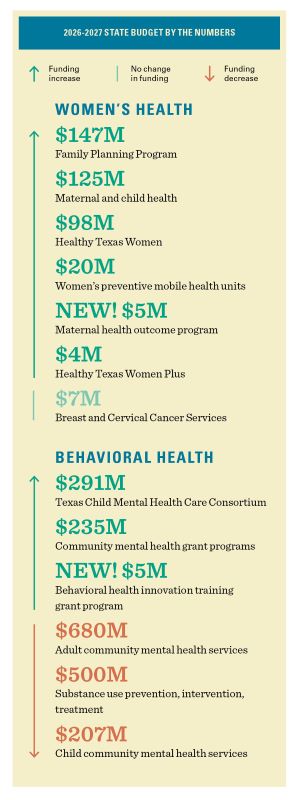
The Texas Medical Association’s advocacy in support of physician autonomy helped propel a raft of legislative gains for women’s health this session, chief among them: the passage of Senate Bill 31, the Life of the Mother Act, by Sen. Bryan Hughes (R-Mineola), which now provides physicians sought-after clarity around the medical emergency exception to the state’s abortion prohibition.
Since 2022, physicians and hospitals have been navigating several different abortion statutes that contain varying language and undefined terms, which created uncertainty in how they could intervene in complex emergency pregnancy situations.
The Life of the Mother Act leaves the current Texas prohibition against elective abortion intact while offering additional clarity regarding the timing and applicability of Texas’ medical emergency exception.
SB 31 “conforms Texas abortion statutes to uniformly define the situation of when a medical emergency occurs by maintaining and clarifying protections against threats to the mother’s life and threats to her major bodily functions,” states a final Senate analysis. The bill also requires that the medical emergency exceptions described by the Act be construed as consistent with certain recent Texas Supreme Court opinions “including with respect to providing that any threat posed by a female’s pregnancy to her life or major bodily functions need not be imminent or irreversible.”
Refining those elements, a process in which TMA was heavily involved, helps to provide more clarity under the law so that “physicians don’t [feel they] have to wait until a pregnant woman is on the brink of death to intervene,” said Dallas obstetrician-gynecologist Deborah Fuller, MD, who sits on TMA’s Council on Legislation.
Other provisions of the law:
- Confirm the burden of proof in criminal prosecutions on the medical emergency exceptions rests with the state and not the physician;
- Clarify the definition of “ectopic pregnancy”; and
- Clarify
that communications between physicians, hospital administrators, and lawyers to help understand and navigate the medical emergency exception are not considered “aiding and abetting” as defined under a separate abortion statute.
The legislation also paves the way for TMA to work with the Texas Medical Board and the State Bar of Texas to develop the continuing education courses that must be created under the law to help physicians and lawyers better understand Texas’ abortion laws. The CME associated with this legislation is a one-time mandatory requirement for physicians providing obstetric care. It applies to new licensees and license renewals starting Jan. 1, 2026.
Women’s health programs also saw significant budget gains this session, in particular for preventive mobile health units and for Healthy Texas Women, Healthy Texas Women Plus, and the Family Planning Program for women transitioning from Medicaid.

And new funding was added for the Texas Higher Education Coordinating Board to study Texas’ OB-gyn physician workforce and to start a new grant program for family medicine postgraduate training with obstetrics training tracks – which is expected to help rural areas lacking such care and the 47% of Texas counties that are maternal care deserts.
Other legislative advancements TMA supported will enable:
- Funding for better collection of maternal and child health data;
- New grants to organizations implementing maternal health outcome programs that reduce severe obstetric complications;
- More money to improve obstetrics care at rural hospitals;
- More timely reports from the Texas Maternal Mortality and Morbidity Review Committee under House Bill 713 (effective June 20).
- Improved mammography reports and patient awareness under Senate Bill 1084;
- The creation of the Maternal Opioid Misuse Program under House Bill 5155;
- A perinatal bereavement care initiative and programs and perinatal palliative care education under House Bill 37 and Senate Bill 1233, respectively; and
- Expanded coverage and services for victims of sexual assault under House Bill 47.
The latter five pieces of legislation all take effect Sept. 1.
Continue to read Texas Medicine Today for legislative updates and related TMA resources in development, and visit TMA's state advocacy webpage.
Editor's note: This story was updated to reflect some legislative developments post-publication in Texas Medicine.
Related 2025 Legislature wrap-up stories:
‘A United Force’: Physicians Answered the Call for Patients, Medicine This Legislative Session
Inside the Capitol – Lessons from the 89th Legislative Session
Access to Care – Advanced
Scope Creep Defense Preserves Physician-Led Care, Patient Safety
Texas Physician Workforce Gets Budget Boost
Texas Medicaid Enrollment Could Benefit from Modernization Funding
Measles Outbreak and E-Cigarettes Shape Session Debates
Practice Viability – Supported
Harmful Insurance Bills Defeated by Physician Advocacy
New Technology Laws Take Effect Sept. 1
Medical Liability Risks Fail to Find Foothold in Texas
Physician Autonomy – Preserved
TMA Helps Craft Balanced Noncompete Compromise
TMA Deflects Onerous Reporting Regs for Independent Practices
Jessica Ridge
Reporter, Division of Communications and Marketing
(512) 370-1395